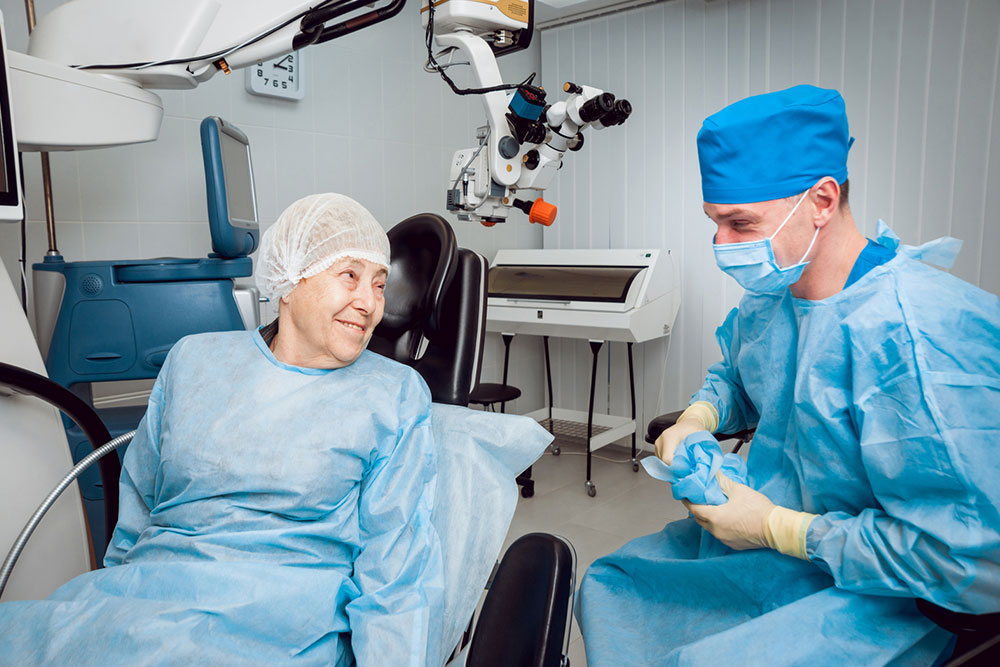
Cataract surgery – Procedure, risks, aftercare, and cost
The eye lens, responsible for focusing the light and creating a sharp image, can become cloudy. This is known as a cataract. The condition can make it difficult to see sharp, clear images, read, and drive. So, it is important to seek treatment here, which typically involves surgical removal of the cloudy lens. This is one of the most common surgical procedures in the country. So, here are key things to know about cataract surgery:
When is cataract surgery recommended?
Cataract surgery usually involves replacing the cloudy lens with an artificial lens. Cataracts usually develop with age and worsen with time. However, the condition has been observed in children at birth. Surgery is generally recommended when the cataract is noticeably affecting and harming the vision. So, the condition may be interfering with daily tasks like driving or reading. Based on an eye examination, the following cataract signs can indicate the need for surgery:
- Blurry vision
- Double vision
- Appearance of halos around lights
- Colors may start to look faded
- Heightened sensitivity to bright lights
- Impaired vision at night
Preparation for surgery
An eye specialist will usually perform an ultrasound test and take measurements of the eye a week before starting the procedure. These steps help the doctor analyze the size and shape of the eye. As a precaution, those undergoing the test are told to avoid eating solid foods six hours before the procedure. Also, they will be asked to avoid driving home on their own after the surgery and will have to make arrangements for the ride home.
Procedure
Cataract surgery is quick, typically taking 20 to 30 minutes. If both eyes have cataracts to be operated on, doctors usually schedule the procedures a few weeks apart. The steps of the procedure can vary, depending on the type of surgical technique being used. However, here is the standard procedure for the most common technique called phacoemulsification:
- First, prescription treatment will be administered to the eye to numb the region, helping minimize pain or discomfort one may otherwise experience during the procedure.
- Then, a small incision is made in the front of the eye. With the help of the ultrasonic probe, the lens is broken, and the cataract is removed.
- Next, an artificial lens is inserted through the incision and positioned exactly where the natural lens used to be. Stitches are not required in this technique.
- Finally, one may be asked to rest for 30 minutes following the procedure, after which they can head home.
Risks
The procedure is typically considered safe, with research suggesting that 95% of those who underwent cataract surgery experienced sharper vision. However, like any surgical procedure, one should consider risks like floaters, dry eyes, cloudiness, blurred vision, eye pain, double vision, and infection that could develop or continue after the surgery.
Recovery and aftercare
One may typically notice an improvement in vision in the first few days following the procedure. However, the eye may take a few months to heal completely. When it comes to post-surgery care, one will be asked to use specific eye drops to prevent infection and pain. One may also have to wear a protective mask while sleeping. Additionally, one must take precautions like wearing sunglasses to protect the eyes from the sun and avoiding touching their eyes. It is also crucial to ensure that things like soap, shampoo, and dust do not enter the operated eye. Here, one must consider avoiding activities like dusting, gardening, using face creams and lotions around the eye, swimming, and coloring the hair for one or two weeks.
Cost
The cost of the cataract surgery could be covered under insurance. However, the overall cost can vary depending on factors like the location of the clinic and the technique used for the surgery. On average, cataract surgery can cost about $2,500. The figure is inclusive of hospital fees, surgeon fees, anesthesiologist fees, and postoperative care. To get a clear picture regarding the total cost, one should discuss the fees and payment options with the eye surgeon. Further, the cost can increase in the following scenarios:
- The surgery is performed in a hospital
- There are complications during cataract surgery
- One undergoing the surgery has other health conditions
- Advanced surgical techniques are used, like laser-assisted surgery
Surgery is considered one of the best options for restoring clear vision when dealing with cataracts. Nevertheless, to make an informed decision about undergoing cataract surgery, one must discuss the procedure, outcomes, and risks of the treatment option with an eye specialist.




